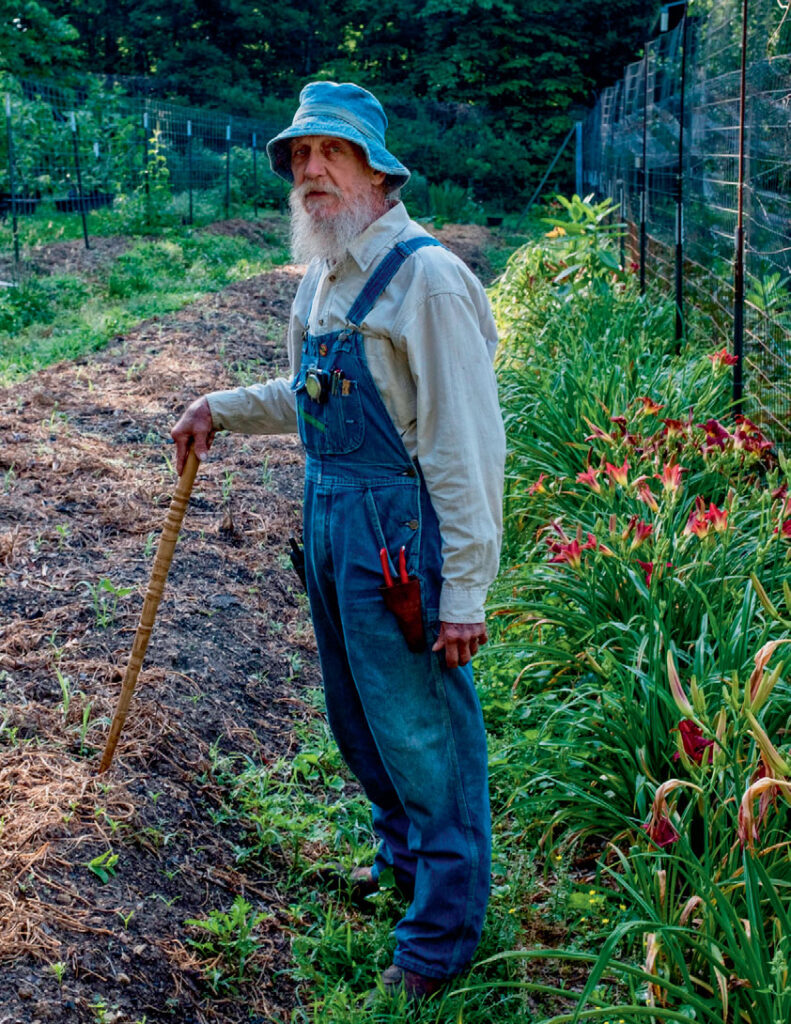
Adam Turtle and his wife, Sue, know what grows well in Tennessee. . . and it just might surprise you.
For the past twenty-seven years, Adam and Sue Turtle have been transforming a patch of scrubby, scrapped-over woods clinging to rocky hills on poor soil into the Earth Advocates Research Farm (EARF). Located in Summertown TN, EARF is a nonprofit dedicated to discovering the best plants and practices for our part of the planet and then educating others. Indeed, EARF is a verdant oasis of permaculture and learning. Along with the research gardens, EARF also features a house and office (built by Adam and Sue themselves), five greenhouses, and a small conference center with classroom and guest quarters, all guttered to feed into an interconnected system of cisterns with a capacity over 110,000 gallons, which Adam and Sue then use to hand water the nursery and the gardens.
Adam Turtle, a self-described “beatnik” and “poly-obsessive” is himself a cultivar of consciousness. A charming, spiritual, and intellectually intense man who freely shares the insights and wisdom of his seventy plus years as a “sentient system” himself, a living piece of planet Earth. “I’m at home in this universe,” he begins,“ but not this society. My life is not merely an economic event. Real income is what falls as rain. Do you grok that?” he asks, using a classic beatnik verb. (Robert Heinlein coined “grok” in ‘61 in the novel, Stranger in a Strange Land.) It means to understand something so profoundly, so intuitively, that it becomes part of who you are. Adam groks plants. He also groks people. I didn’t ask, but my hunch is that — with the exception of Sue — he generally prefers the company of the plants.
“I’m on a mission,” he confides. “We’re trying to broaden our food base, working with relatively unknown cultivars. Our society is not food secure even though the grocery store is full of what we — Sue and I — call ‘food-like’ items. That’s the genesis of EARF. We wanted to test and evolve our ideas and our understanding. Are we really stewards, or do we just want to wear the name?”
And test they have. The Earth Advocates Research Farm currently grows a profusion of plants from chestnuts to edible flowers. Just a small selection of highlights includes 25 to 30 types of chilies, two types of hardy citrus (producing a fruit that tastes like a cross between a lemon and a grapefruit with a hint of mango), and a patch of Opuntia engelmannii, a species of prickly pear cactus. “It’s a cactus that grows really well in middle Tennessee,” Sue says, “Especially with good drainage. It performs better than the 20 plus other species we tested for over 15 years. Plus, once established, it’s neglect tolerant. Last year we sold about 300 of the tunas (the name of the cactus fruit) to customers and area restaurants. I like to make a syrup that we use either in cooking or on yogurt or ice cream.”
But whether bamboo or pepper, citrus or cactus, to make the cut at EARF, all plants must be both heat and cold tolerant and fully at home in middle Tennessee. “We don’t water plants after year one,” Adam says, explaining the essence of low-input sustainability. “If it’s the right plant, why shouldn’t it be neglect tolerant?”
It’s a form of tough love applied to plants. But Adam points it at society as well. “Our real specialness is in our potential,” he maintains. “Not in our license or our privilege. The bottom line is caring for the Earth and, if the needs of the Earth don’t come before the wants of people, there may not be many future people. As the Amish express it, enough is sufficient.”
Need a blueberry, lemon or fig tree? You can find Adam and Sue at the Franklin Farmers Market at their stall that is a fully functioning EARF satellite.